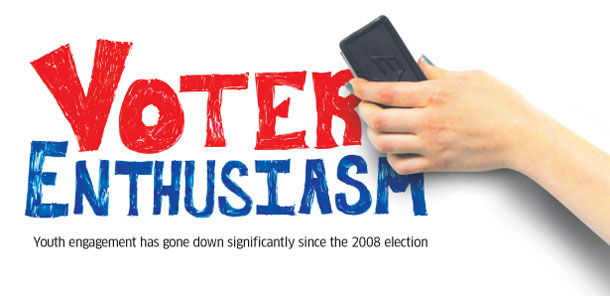Days away from the 2012 election, presidential hopefuls Mitt Romney and Barack Obama still struggle to engage young voters.
The outcome is expected to be tight. The excitement that surrounded the 2008 election, particularly over Obama’s message of hope and change, isn’t present among young voters this election year.
In late September, the Pew Research Center reported figures that paint a striking picture of the struggle to engage voters.
“The share of voters younger than 30 who are following campaign news very closely is roughly half of what it was at this point four years ago,” the report said.
In observing young voters over the course of 2012, Pew Research Center poll results revealed that only 50 percent of eligible voters aged 30 and under were sure they were registered.
Several Madison College students shared their perspectives on the race thus far. Across the political spectrum, their reactions revealed many of the indicators of disengagement.
Matthew Neri, 22, is a member of the International Socialist Organization on campus. His political outlook has changed significantly since 2008, when he came to the conclusion that mainstream politics didn’t come with truthful intentions. Although he voted for Obama in 2008, over the past four years, he has become increasingly turned off by his policies and the two-party system.
“The reason I’m less enthusiastic to vote this year is because I understand that, as far as working class interests are concerned, there’s not that huge of a difference between Obama and Romney,” Neri said.
He explained that he is disappointed in Obama’s use of drone strikes overseas and his attacks on civil liberties and union rights at home.
He will likely vote for Green Party candidate Jill Stein.
“You have two political parties competing for money and favors and the same interest groups, for the most part,” Neri said.
Jonathan Correa, 22, also feels discontentment with the two-party system. Like Neri, he has green party leanings, but considers himself an independent. He’s unsure about whether or not he will vote this year. He said he’s been watching the debates a little but hasn’t really been keeping track of politics.
“I really do feel like my voice doesn’t count so I feel like it’s hard for me to support either person because I feel like they are saying the same things, but just in a different way,” Correa said.
Some students still maintain their confidence in Obama. Anna Miller,18, and Chris President-Brown, 19, are both registered voters and plan to cast their votes, for the first time in their lives, for the incumbent on Nov. 6. However, their support doesn’t come without certain reservations.
“I don’t like the fact that the government is trying to take control of everything. The Obamacare thing, I’m not really a fan of it,” Miller said
President-Brown explained that it will take time for Obama to see results from his plan.
“You can’t really do it all over one term, you need more than one,” he said.
David Canon, Political Science professor at UW-Madison, believes that young voters who previously propelled Obama to victory, will also follow through this year. One the enthusiasm gap, Canon said, “There was one earlier in the year due to the rough economy, but the economy is improving.”
“Voting preferences remain largely the same as 2008,” Canon said.
On the other side of the political divide, Romney also struggles to attract young voters. Although the Pew Research center indicates that “registered voters under 30 favored Obama over Romney 59% to 33%,” those young voters that do support Romney are less engaged in the electoral process.
Brooke DeArmond, 19, is one such student. She has not followed the presidential debates much this year. She feels confident in her choice for Romney because of his priorities on reviving the economy and healthcare.
“I know that Obama is helping people who don’t have the money, but I don’t agree with him taking money from people for other people who don’t work,” DeArmond said.
Her mother works in the health insurance industry and DeArmond saw her face hardship last year when she had to switch the family’s insurance plan due to rising expenses. Ones her mother feels were brought on by his new healthcare legislation.
The Pew Research Center report noted that young voters register in increasing numbers as the months of an election year pass. Yet given the lack of engagement thus far, candidates may be in for a lower turnout on election day.
Luke Niesen, 18, has not registered to vote yet, but he plans to cast his vote for Romney.
“Obama had four years and made all these promises and we are worse off than we were before,” he said.
He worries about growing national debt and the fragile economy. Currently active duty in the Army, he thinks Romney will help create jobs and keep the military safe through increased defense spending.
While poll results may portray Niesen and others in his age group as disengaged voters, presidential hopefuls may find that a surge in excitement could come just in time from young voters like him.
“It’s my first time voting so I’m excited about that,” Niesen said.


























